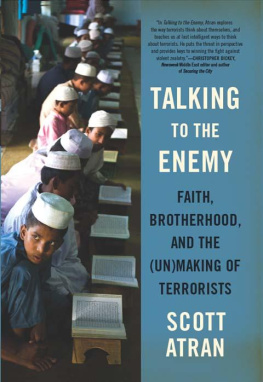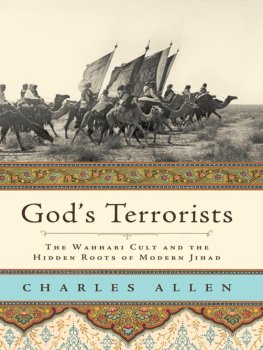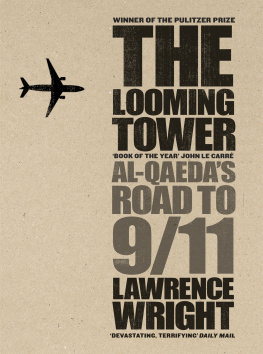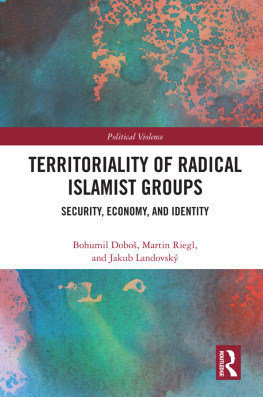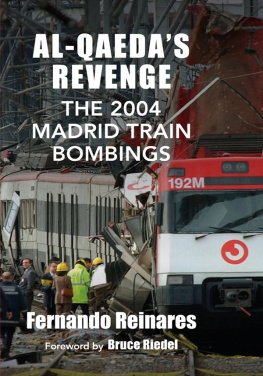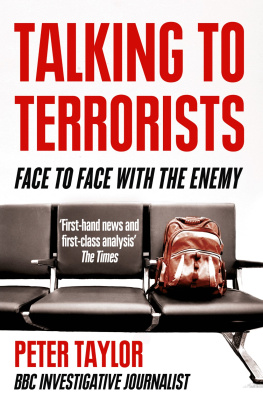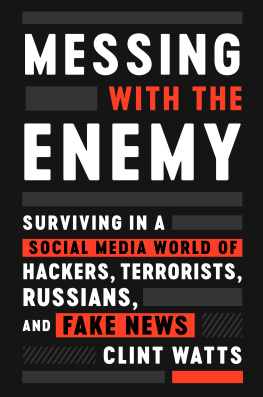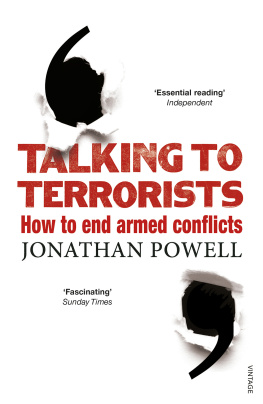Scott Atran - Talking to the Enemy: Faith, Brotherhood, and the (Un)Making of Terrorists
Here you can read online Scott Atran - Talking to the Enemy: Faith, Brotherhood, and the (Un)Making of Terrorists full text of the book (entire story) in english for free. Download pdf and epub, get meaning, cover and reviews about this ebook. year: 2010, publisher: Ecco, genre: Politics. Description of the work, (preface) as well as reviews are available. Best literature library LitArk.com created for fans of good reading and offers a wide selection of genres:
Romance novel
Science fiction
Adventure
Detective
Science
History
Home and family
Prose
Art
Politics
Computer
Non-fiction
Religion
Business
Children
Humor
Choose a favorite category and find really read worthwhile books. Enjoy immersion in the world of imagination, feel the emotions of the characters or learn something new for yourself, make an fascinating discovery.
- Book:Talking to the Enemy: Faith, Brotherhood, and the (Un)Making of Terrorists
- Author:
- Publisher:Ecco
- Genre:
- Year:2010
- Rating:4 / 5
- Favourites:Add to favourites
- Your mark:
Talking to the Enemy: Faith, Brotherhood, and the (Un)Making of Terrorists: summary, description and annotation
We offer to read an annotation, description, summary or preface (depends on what the author of the book "Talking to the Enemy: Faith, Brotherhood, and the (Un)Making of Terrorists" wrote himself). If you haven't found the necessary information about the book — write in the comments, we will try to find it.
Terrorists dont kill and die just for a cause.
They kill and die for each other.
In this rigorous and challenging work that combines the penetrating insight of The Looming Tower and the historical sweep and scope of Guns, Germs, and Steel, renowned social scientist Scott Atran traces terrorisms root causes in human evolution and history, touching on the nature of faith, the origins of society, the limits of reason, and the power of moral values.
Atran interviews and investigates Al Qaeda associates and acolytes, including Jemaah Islamiyah, Lashkar-e-Tayibah, and the Madrid train bombers, as well as other non-Qaeda groups, such as Hamas and the Taliban, and their sponsoring communities, from the jungles of Southeast Asia and the political wastelands of the Middle East to New York, London, and Madrid. His conclusions are startling, important, and sure to be controversial.
Terrorists, he reminds us, are social beings, influenced by social connections and values familiar to us all, as members of school clubs, sports teams, or community organizations. When notions of the homeland, a family of friends, and a band of brothers are combined with the zeal of belief, amazing thingsboth good and badare possible: the passage of civil rights legislation, the U.S. Olympic hockey teams victory in 1980, the destruction of 9/11 and the attacks on the London Underground in July 2005.
Atran corrects misconceptions about suicide bombers and radical Islam, explaining how our tolerance for faith enables extremists to flourish, and shows why atheism and science education have little effect. Going beyond analysis, he offers practical solutions that can help us identify terrorists today, prevent the creation of future terrorists, and ultimately make the world a safer place for everyone.
From Publishers WeeklyAtran (In Gods We Trust) examines the motivations of terrorists in this sprawling and timely study. Drawing upon years of travel among Muslim communities from Indonesia to Morocco, extensive interviews with would-be martyrs and holy warriors, and detailed surveys, the author concludes that young jihadists arent merely motivated by political or religious fervor--they are powerfully bound to each other, they were campmates, school buddies, soccer pals, and the like, who become die-hard bands of brothers. Besides the importance of group dynamics in spawning terrorists, the author highlights the role of sacred values --core cultural values--that often trump other values, particularly economic ones. Within this context, Atran argues that the best measures against todays terrorist threat--which is more opportunistic, more scattered and disjointed, than it was before 9/11--are soft-power initiatives to provide alternative heroes and hopes within Muslim communities and to reframe sacred values. Atrans intellectual reach is prodigious; his analysis of the underpinnings of terrorism is instructive, if often unconventional; and his provocative prescriptions merit debate and consideration. Copyright Reed Business Information, a division of Reed Elsevier Inc. All rights reserved.ReviewTalking to the Enemy is Atrans impassioned call for evidence-based policy, but its also an ambitious survey of culture and violence. Research is the trump card here, played often and well. (David Shariatmadari, The Guardian)Talking to the Enemy is about far more than violent extremism. One of the most penetrating works of social investigation to appear in many years, it offers a fresh and compelling perspective on human conflict. (John Gray, Literary Review)Talking to the Enemy is recommendable not just for its vivid insights into the motivation of terrorists, butalso for its study of Islamic radicalisation and the anthropology of religion in general. (Michael Bond, New Scientist)Talking to the Enemy is an important book, by turns fascinating, dense, scientific, debatable, illuminating. (David Aaronovitch, The Times)Scott Atran is one of the worlds most important and innovative thinkers on the local and global dynamics of violent Islamist extremism. . . . Required reading for those trying to understand and address the problems of terrorism in the 21st century. (Juan Zarate, Center for Strategic and International Studies, Deputy Assistant to the President and Deputy National Security Advisor for Combating Terrorism 2005 - 2009)What can be done to undo future jihadist networks? renowned anthropologist Scott Atran has carried out a very thorough study with surprising findings on what motivates those who kill and die. (Luis Miguel Ariza, El Pais)Atran has given us a remarkably honest book, demonstrating that down-to-earth field work can give us a far superior understanding of what makes terroriststick than whole armies of armchair counter-terrorist experts. (Perspectives on Terrorism)This deeply researched, wide ranging, and very timely study provides a compelling and often surprising account of what lies behind the jihadi phenomenon . . . . It should be read carefully, and pondered. (Noam Chomsky)Atran explores the way terrorists think about themselves and teaches us, at last, intelligent ways to think about terrorists. He puts the threat in perspective and provides keys to winning the fight against violent zealotry. (Christopher Dickey, Newsweek Middle East Editor and author of SECURING THE CITY)The stories Atran brings back from talking to jihadists and their supporters are gripping, and the result of his experiments that probe their sacred values are compelling. The insights he gains tell us more than we knew before about what it means to be human. (Robert Axelrod, Walgreen Professor for the Study of Human Understanding at the University of Michigan, author of The Evolution of Cooperation, and recipient of the National Academy of Sciences Award for Behavioral Research Relevant to the Prevention of Nu)Atran is one of the worlds most important thinkers on the local and global dynamics of violent Islamist extremism. His research on what motivates young men to fall prey to violent ideologies is required reading for those trying to understand the problems of terrorism in the 21st century. (Juan Zarate, Center for Strategic and International Studies, Deputy Assistant to the President and Deputy National Security Advisor for Combating Terrorism 2005 - 2009)[Atrans] rigorous research not only debunks the claims of pundits who sit lightly to academic discipline but also challenges unscientific attacks on religion by senior scientists. The political implications of his well-grounded analysis are profound but conveyed in an accessible style which left me excited and hopeful. (John, Lord Alderdice, Chairman of the Liberal Democrat Party in the House of Lords, former Speaker of the Northern Ireland Assembly and President of Liberal International)A riveting account of the motivational basis of terrorism and field material of rare quality. Dismantling the myths that guide the so called war on terror, he provides the tools to address a global problem rationally and effectively. (Carlo Strenger, Graduate Chair of Clinical Psychology, Tel Aviv University, and columnist for Haaretz)Scott Atran is one of the very few persons who understand religion and have figured out that religion is not about belief and cannot be naively replaced without severe side effects. (Nassim Nicholas Taleb, Distinguished Professor, New York University Polytechnic Institute, author of The New York Times bestseller The Black Swan)Historically keen and astutely humanistic...the authors deep penetration into anthropological explanations of evolution, teamwork, blood sport and war attempt to define what it means to be human. (Kirkus Reviews)Recommendable not just for its vivid insights into the motivation of terrorists, but also for its study of Islamic radicalization and the anthropology of religion in general.. (New Scientist)A highly readable round-the-world examination of the jihad and its adherents. . . . Atran pieces together the lives and the backgrounds of extremists, offering insightful perspectives by placing contemporary Islamist dissent into a deeper context of human evolutionary history. (Richard Phelps, Financial Times)Atran has given us a remarkablly honest book, demonstrating that down-to-earth field work can give us a far superior understanding of what makes terrorists tick than whole armies of armchair counterterroris experts. (Alex Schmid, Perspectives on Terrorism)Atrans intellectual reach is prodigious; his analysis of the underpinnings of terrorism is instructive, if often unconventional; and his provocative prescriptions merit debate and consideration. (Publishers Weekly)Sets us and our governments straight about a long list of dubious assumptions. He is sure that we must talk before we shoot, and that we must learn to distinguish real threats from imagined ones. (Jeremy Harding, London Review of Books)Scott Atran: author's other books
Who wrote Talking to the Enemy: Faith, Brotherhood, and the (Un)Making of Terrorists? Find out the surname, the name of the author of the book and a list of all author's works by series.

